#69: Find A Conversation Bigger Than Yourself
A weekly newsletter on work, life & the creative journey
September 28th, 2019: Greetings from Taipei. I’m back in Taiwan after wandering through Japan for almost a week. If you’re headed to Japan, I recommend checking out Pico Iyer’s A Beginner’s Guide To Japan to accompany your travels. Here is a shot from Nara, Japan:

👋 We had a flurry of signups this week - welcome to the newsletter Andy, Kristin, Sean, Vannesa, Alex, Morgan, Dominique, Rob, Erica, Kopavi, KSBaxter, Zach, SE, Nur, Paul, Shannon, Lina, Monica, Atilla, Felicetty, Pmar, Ashley, Dean, Frank, Luce & Michael
🙏 Forward this to a friend who might get a kick out of it via e-mail, share on twitter or find other ways to support here#1 Are you in a conversation bigger than yourself?

As many of you know, I’m a big fan of David Whyte - I believe his ability to get to the heart of what matters with words magical. I stumbled upon this interview in 2007 of Whyte in HBR in which he describes the power of conversations:
A real conversation is one that, no matter how slowly, helps you make sense of the world around you.
I’ve always been drawn to the idea of trying to make sense of the world and the people that are willing to suspend themselves in the inherent uncertainty of these deep questions to see where a “conversation” might take us.
This past week I spent time with my partner and a good friend in Japan. Each of us is on some sort of journey that doesn’t really fit to any easy to understand path in the modern world and each of us has proactively abandoned a path that makes sense measured by money, comfort and certainty.
Over five days we found ourselves in multiple conversations grappling with the inherent uncertainty of living such a life, the fear of not knowing and the inevitable challenge of still needing acceptance and belonging from our family and friends.
We also tried to make sense of the deeper questions - those pesky ones like “what is the meaning of life?” and “what is a ‘good life?”
I don’t have any answers for you, but being in those conversations reminds me it is what brings me alive. When I reflect back on my corporate life, it is these types of conversations that were missing.
My favorite essay of all time is William Derschewitz “Solitude and Leadership” which talks about need for solitude and reflection as a vital aspect of living a good life and the foundation of what we can call “leadership.” He argues that conversation can be a form of this type of insight:
Introspection means talking to yourself, and one of the best ways of talking to yourself is by talking to another person. One other person you can trust, one other person to whom you can unfold your soul. One other person you feel safe enough with to allow you to acknowledge things—to acknowledge things to yourself—that you otherwise can’t. Doubts you aren’t supposed to have, questions you aren’t supposed to ask. Feelings or opinions that would get you laughed at by the group or reprimanded by the authorities.
There’s something about being self-employed and carving your own path that forces an almost daily reflection on the questions of what matters. While many people shy away from taking a bold leap because of this - the emergence of self-doubt, shame and fear are inevitable - they might be missing the beauty of being in an ongoing conversation bigger than one’s self.
Are you part of a conversation that matters to you?
+To go deeper with David Whyte, I suggest The Three Marriages or The Heart Aroused (affiliates) or this podcast conversation with the delightful Krista Tippett
#2 Elephants & Loch Ness Monsters
There is a famous graph in economic circles showing the shifts in economic prosperity around the world that looks like an elephant from 1988 to 2008:
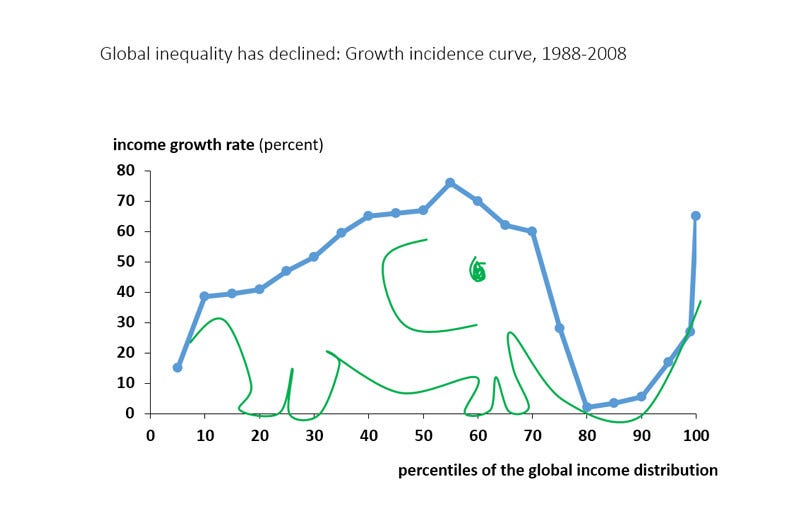
Some people argued that the data was cherry picked, so an updated graph that didn’t take as aggressive as assumptions was created:
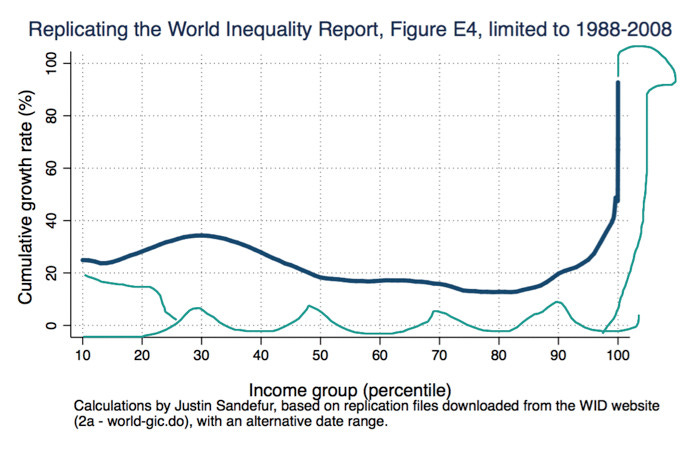
Both graphs show a dip that many economists believe represents the lower and middle classes of “rich” countries.
Andrew Mcafee has argued that this dip is driven by the dwindling of routine jobs that once came with a guarantee of good wages and a good life - clerical jobs, manufacturing jobs. This trend is well documented by David Autor - he calls them “middle skill” jobs:
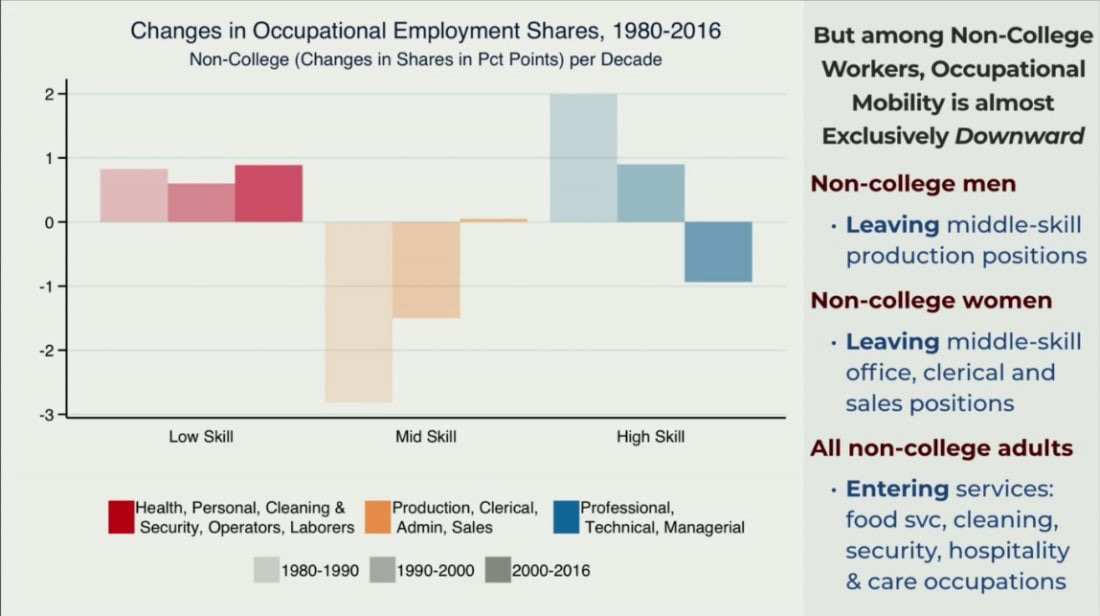
In addition to the disappearance of these stereotypical middle class jobs is a broader shift in the disconnect between labor and productivity: Here is a graph from the US:
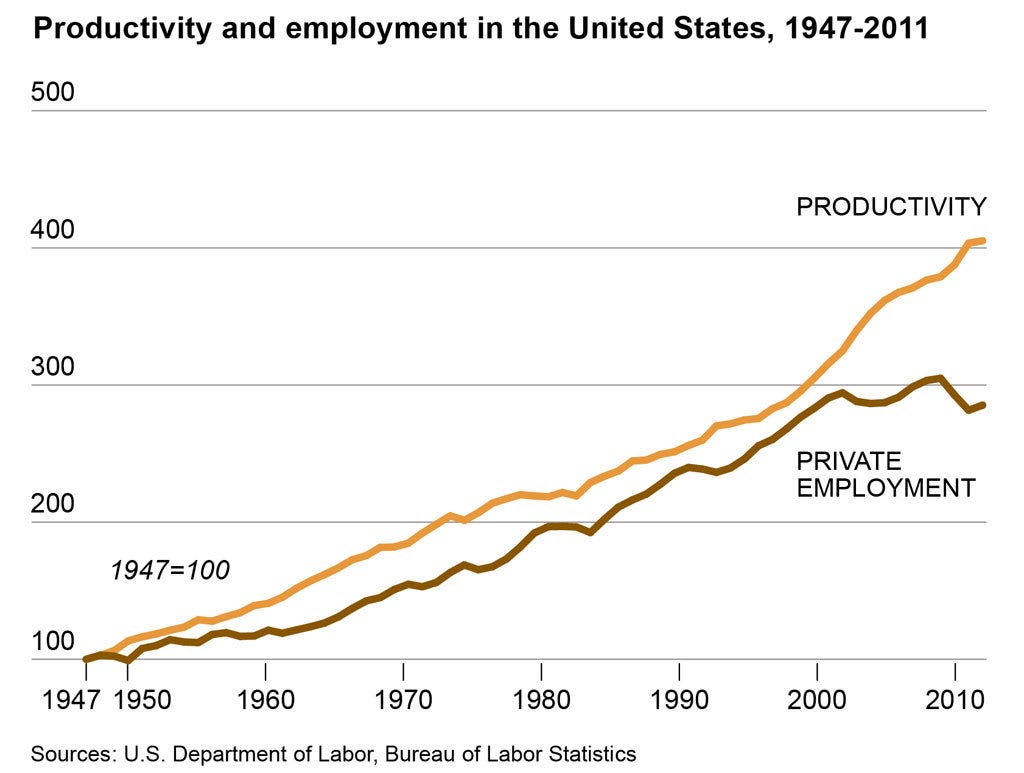
While you can argue the employment had not fallen away and that the employees are just located in Bangalore and Manila there is an inescapable need to figure out how to grapple with our current work beliefs.
When you propose that people should just be able to work less you get strong disagreement, even anger. Most people do recognize that it is a good thing that we need less people to work to meet our basic needs, but struggle to identify how we can decouple our need to for dignity and with how closely we tie it to work and “earning a living.”
Oshan Jarrow posed this question on twitter earlier this week:

The most striking example of how work is stifling "living" as Oshan puts it is the finding that unemployed men volunteer less than employed men. There is something shameful about unemployment that leads people, especially men, to hold back with engaging with society if they lack a job (it is worth noting that women’s behavior did not change).
It seems one of the questions our society will need to grapple with is how to we create a modern culture where people are looking to engage with the world - with or without having a job first? Or at least before UPS starts laying off drivers:

+To go deeper on unemployment read this whole post on unemployment from Scott Alexander and watch this whole lecture from David Autor
#3 But What Do People Want?
From a new survey from Gallup on “success”:

It appears that a large majority of people operate on default assumptions about “what society wants” that don’t appear to be real beliefs held by a vast majority of people:
Most Americans believe others in society define success in status-oriented and zero-sum terms, but less than 10% apply this standard to their personal definition of success.
More disconnects:
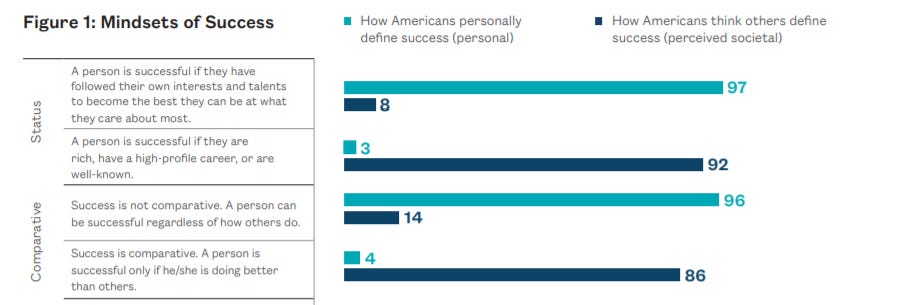
I do recommend checking out the full report here but its worth noting that people ranked “being famous” as the least important (of 76 items) element of success while ranking it the most important element of perceived societal importance.
#4 Debt Jubilee?
I’m interested in the organizations operating around the fringes. I stumbled across this organization called Rolling Jubilee that buys up people’s debt with the intention of never collecting it:
Banks sell debt for pennies on the dollar on a shadowy speculative market of debt buyers who then turn around and try to collect the full amount from debtors. The Rolling Jubilee intervenes by buying debt, keeping it out of the hands of collectors, and then abolishing it. We’re going into this market not to make a profit but to help each other out and highlight how the predatory debt system affects our families and communities.
They ended up stopping this in 2013 and shifted towards a broader movement called the Debt Collective. It seems they are trying to create tools to help people grapple with debt - especially student loans and medical debt.
#5 Marcus Buckingham on Work
Marcus Buckingham helped create the famous strengths finder test at Gallup and now is a researcher and author, having published "Nine Lies About Work: A Freethinking Leader’s Guide to the Real World Kindle Edition.”
He was on friend Cody Royle’s podcast this week, Where Other’s Wont. A couple takeaways:"
Marcus says that the best way to judge leadership is not by competencies but by followership - he says that the research find clear and consistent reactions in followers towards a leader while finding no evidence of a consistent definition of “leadership” that can be used for assessment
He also says that “followership is forgiveness” which I love. All leaders are flawed - its just that we are willing to forgive the ones we follow for those flaws.
🎧 You can check out the episode here.
#6 Uber For Talent?
It looks like Uber is entering the talent space, launching Uber Works
The platform is designed to help blue-collar workers such as clerks and chefs, without requiring them to re-enter their credentials every time they sign up for a new job. The technology will also allow them to have oversight of the shifts they do in one place.
This seems obvious if you think about the millions of contractors it already works with on its driving app and uber eats and the rather high profits of staffing firms - often 40-50%. It will be interesting to see how broad Uber tries to engage in this market. If its other business units are any indication, this may be something to watch.
#7 A Poem From Kurt Vonnegut:
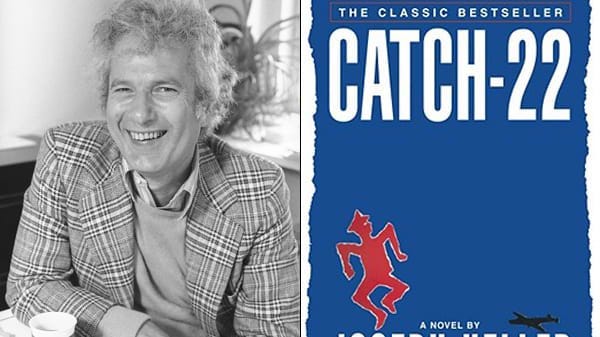
True story, Word of Honor:
Joseph Heller, an important and funny writer
now dead,
and I were at a party given by a billionaire
on Shelter Island.I said, “Joe, how does it make you feel
to know that our host only yesterday
may have made more money
than your novel ‘Catch-22’
has earned in its entire history?”
And Joe said, “I’ve got something he can never have.”
And I said, “What on earth could that be, Joe?”
And Joe said, “The knowledge that I’ve got enough.”
Not bad! Rest in peace!
See you next week!

Want to Support Boundless? All of the options here
🙋♂️ If you want to learn more about who I am or what I’m working on, find me here. Have a good weekend 😃If you aren’t subscribed to the e-mail, join us here:









